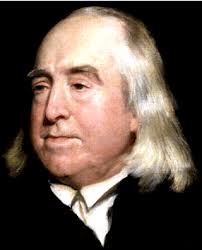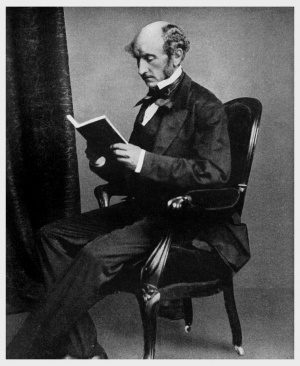Utilitarian Philosophy
Utilitarian philosophy or Utilitarianism is a form of Consequentialism that focuses on the outcome of one's actions. This philosophy is most frequently applied as a means of understanding the moral quality of a particular action. In order to discern whether an action is morally right or wrong, you must first discover its maximum utility or potential to improve overall well-being, pleasure, or happiness among all forces which are directly affected by that action. An early proponent of Utilitarianism, Jeremy Bentham, referred to this belief as the "greatest happiness principle". Utilitarian philosophy poses ethical concerns regarding the concept of "the greater good", moral agency, and value ethics.
Contents
Twentieth Century Utilitarian Philosophy
Being a moral theory, utilitarianism focuses on the consequences of an action to determine if an act is morally correct, instead of focusing on the intent of the one committing the action. Furthermore, it uses the principle of utility for this effort by suggesting that if the consequence results in a benefit for the greater good, then the action is right. Utilitarianism also believes that no singular person's happiness holds higher precedence than a fellow human being's. According to this theory, happiness or pleasure is the right act. It is often compared with Hedonism. Utilitarianism can also be considered a form of consequentialism. Consequentialism is an ethical theory that focuses on the result to judge the act. Based on this view, it supports the act if it produces good, as being morally correct.
In the past two centuries, numerous variants of Bentham's original form of Utilitarianism have emerged. Each unique form aims to answer the practical question of how one should live their life in order to achieve the highest ethical good.
Act Utilitarianism
Act utilitarianism, or classical utilitarianism, suggests that in any given situation you should choose the action that produces the greatest good for the greater number. One example of this is spending an entire free day volunteering, instead of laying in bed.
Rule Utilitarianism
Rule utilitarianism suggests that we must live by rules that produce the greatest good for the greater good. Rule Utilitarianism is setting a precedent to contribute to the greater good forever. For example, volunteering every single free day you have.
Classical Utilitarians
Classic Utilitarians, like Jeremy Bentham and John Stuart Mill, identified good with pleasure. They can be equated with Epicurus, and are hedonists about value. Similarly, they believed we must maximize good and bring about the greatest amount of good for society as a whole. [1] Bentham and Mill were contemporaries. Mill would eventually be taught by Bentham after being approached by Mill's father.
Jeremy Bentham
Jeremy Bentham was an English philosopher and radical political man. He was primarily known for his moral philosophy which includes utilitarianism, specifically the overall happiness created for society affected by specific actions. Bentham was influenced by philosophers like John Locke and David Hume during the Enlightenment, which is what lead him to develop ethical theory grounded by the empiricist account of human nature. His account of motivation and value was hedonistic in the sense that he believed pleasure and pain are fundamentally valuable and ultimately motivate humans. According to Bentham, happiness is a matter of gaining pleasure and lacking pain.[2]
Led by Bentham and James Mill, the father of his future star pupil, John Stuart Mill, the group included David Ricardo, George Grote, Sir William Molesworth, John Austin, and Francis Place.
Both Bentham and Mill led this group in the name of political reform, believing that the current system under which the country was ruled by was antiquated. Many of their beliefs included universal male suffrage and economic policy that was not favorable to the aristocrats.
John Stuart Mill
John Stuart Mill was born in 1806 and died in 1873. He deeply influenced the British thought and political discourse of his time. His work was composed of a compilation of logic, epistemology, economics, social and political philosophy, ethics, metaphysics, religion, and current affairs. His more well-known publications are A System of Logic, Principles of Political Economy, On Liberty, Utilitarianism, The Subjection of Women, Three Essays on Religion, and his autobiography. His educational development was fostered mainly by his father who inspired him to learn several languages from a young age. Mill felt the influence of historicism, French social thought, and Romanticism, in the form of thinkers like Coleridge, the St. Simonians, Thomas Carlyle, Goethe, and Wordsworth. This inspired his search for a new philosophical radicalism that would be more open to limiting reform forced by culture and history. He would emphasize the growth of humanity, including the cultivation of dispositions of feeling and imagination, something he missed out on in his own education. [3]
Ethical Issues
The Trolley Problem
Commonly referred to The Trolley Problem, this theoretical quandary occurs where one is in a position to prevent a tragedy by making the choice of whether or not to pull a lever. A runaway trolley is headed for five incapacitated people stuck on the track. If you pull the lever, the trolley will follow an alternate route only hitting one incapacitated person. Do you pull the lever? [4]
In order to make the decision, utilitarian philosophy can be applied. Having learned that the morally right thing is to do what benefits the greater good, then surely switching the lever to alter its course towards the poor, lone soul is what you ought to do, right? But how can we measure the happiness of this individual and why does the happiness of five people outweigh one? How can we quantify a measure that is arguably very subjective? If we knew more about each individual and what they could possibly do in this world, does that make us vulnerable to any biases we may have?
This the core issue with utilitarian philosophy. While it allows us to solve theoretical issues like this, can it actually be applied in a real-world scenarios?
Virtue Ethics
In his work "Utilitarianism", John Stuart Mill addresses his white, Christian audience by arguing against the notion that utilitarianism is immoral. Many Christians perceived utilitarianism as a godless doctrine, however, Mill contended that utilitarian ethics embody the preachings and practices of Christianity in its principle concern for the wellbeing and happiness of others.[5] Utilitarianism strives to take objective approaches in ethical dilemmas, however, much of its ethical philosophy can be attributed to the values of the philosophers themselves. Many utilitarian philosophers believed in deism and evaluating decisions based on a moral standard of happiness.[5] This view, however, aligns more centrally with European and American ideals, and has been criticized for its limitations. With the advent of the computer revolution, many scholars have urged that virtue ethics should replace utilitarian beliefs, which put too much emphasis on user experience and wellbeing.[6] The argument for a virtue ethics approach to evaluating decisions can best be justified by the effects technological changes have on users' characters as a whole, which extends beyond just the happiness (or lack thereof) among users.[6]
Utilitarianism in AI
Utilitarianism is sometimes discussed as "utilitarian calculus" by philosophers studying AI. Algorithms in AI that use this calculus follow the utilitarian framework by selecting actions that maximize utility. When theorizing the singularity, some consider AI's use of utilitarian calculus'in regards to how future AI might be treated; an AI that strictly follows a utilitarian algorithm exhibits their lack of moral agency or consciousness[7].
See Also
References
- ↑ Driver, Julia. “The History of Utilitarianism.” Stanford Encyclopedia of Philosophy, Stanford University, 27 Mar. 2009, plato.stanford.edu/archives/win2014/entries/utilitarianism-history/.
- ↑ “Jeremy Bentham.” Internet Encyclopedia of Philosophy, www.iep.utm.edu/bentham/.
- ↑ “John Stuart Mill.” Internet Encyclopedia of Philosophy, www.iep.utm.edu/milljs/.
- ↑ “Trolley Problem.” Wikipedia, Wikimedia Foundation, 1 Apr. 2019, en.wikipedia.org/wiki/Trolley_problem.
- ↑ 5.0 5.1 Mill, J., "Utilitarianism", 1895
- ↑ 6.0 6.1 Vallor, S., "Social networking technology and the virtues", August 2009, p. 157-170
- ↑ Burton, Emanuelle, et al. “Ethical Considerations in Artificial Intelligence Courses.” AI Magazine, vol. 38, no. 2, 2017, p. 22., doi:10.1609/aimag.v38i2.2731.

